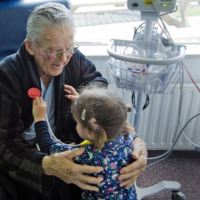How to Reach Out to Loved Ones Facing End of Life Illness

Visiting loved ones that are living with an incurable disease can be hard — knowing what to say, what to do or how to act may be difficult. But time is of the essence. Here is a short list of activities that can help you engage with loved ones who are in hospice care.
1. Remember the good times.
Now is a great time to bring up fond memories and “remember when” stories. This often will lift the spirits of the patient and also provide a much-needed distraction. A few laughs may be just what the doctor ordered. Feel free to bring pictures, videos, or music that you know will bring them joy. Positive reminiscing can help the patient recall the great times they had — moments of warmth, of joy, and pleasure. This form of nostalgia can greatly impact a loved one.
2. Talk, but on their terms.
While talking with a loved one in hospice care is very therapeutic for the patient and visitor alike, be sensitive to their willingness to speak. If they don’t want to speak, don’t press it. If they can only answer in “yes” or “no” gestures, only talk in ways where those are the only necessary answers. Keep your talking to subjects that you know they like and remain positive. Never squabble or speak ill of others while in their presence.
3. Read to them.
Reading to loved ones in hospice care — whether fictional stories or on a subject you know they enjoy — is a great way to spend time with them. Bring a variety of works you think they may enjoy and let them choose which selections you will read. Get their feedback on the content of what you’re reading as you go in order to include them. They should always feel like you are reading to them and not at them.
4. Touch and interact with them.
With proper permission, don’t feel worried about touching them. Brushing hair, giving hand or foot massages, or just holding their hand can help make them feel special. Interact with love and respect. Touch not only helps them bond with you but also helps them to feel loved.
5. Just be with them.
Sometimes, nothing needs to be said. Letting the patient guide the conversation can sometimes result in complete silence...and that’s ok. The silence may feel uncomfortable, but let it serve its purpose — just time spent in their presence. Looking into the face and the eyes of a loved one can provide immense comfort to the patient and visitor alike.
6. Say goodbye to them.
The patient likely knows that they are dying, so it is typically ok for you to say goodbye. It may be hard to do and some tears will more than likely flow, but this is quite healthy. Offer hugs and tell the person how they have impacted your life. Tell them, lovingly, how much you will miss them and that you will never forget them. This feeling of being remembered can feel like a victory over dying for many hospice patients.
Cura-HPC | Your source for compassionate care.
If you or a loved one require hospice care services, the friendly professionals at Cura-HPC can definitely help. Our experienced and nurturing medical professionals provide specialized care that is sensitive to the unique needs of patients and their loved ones.



